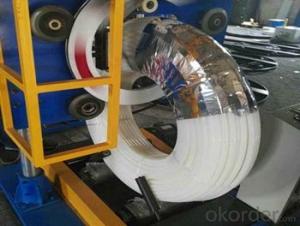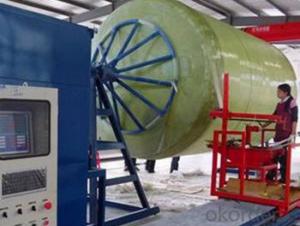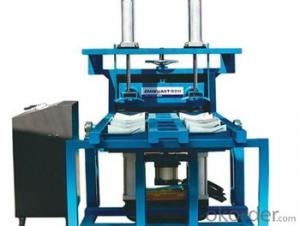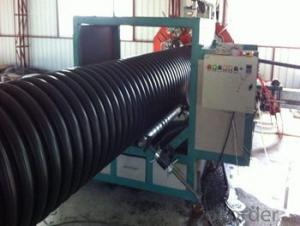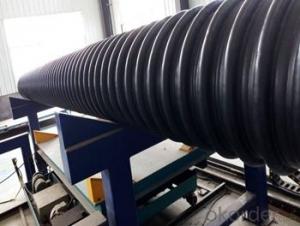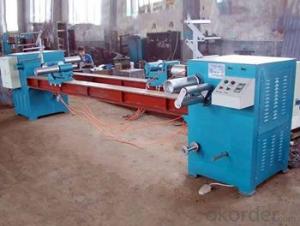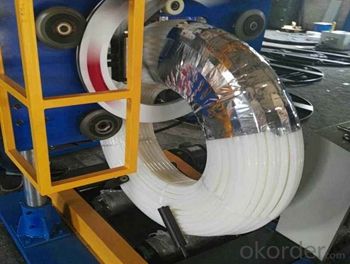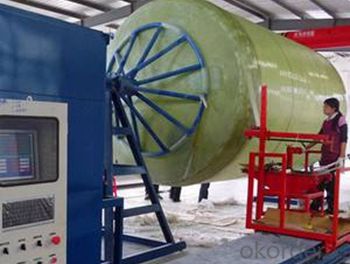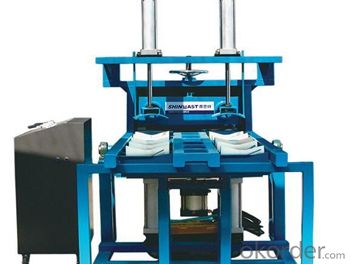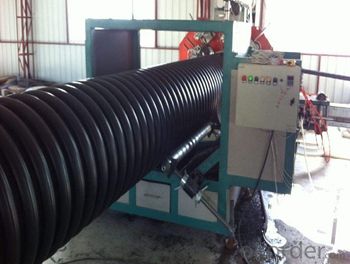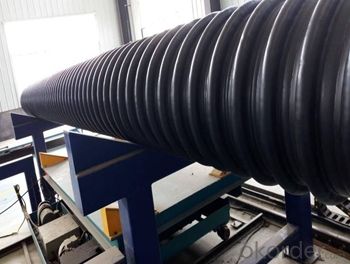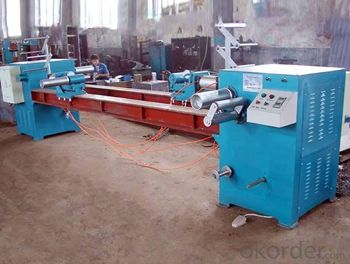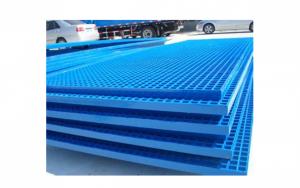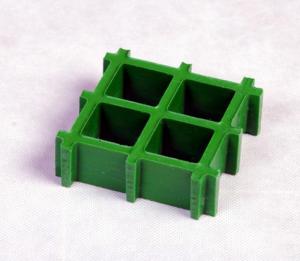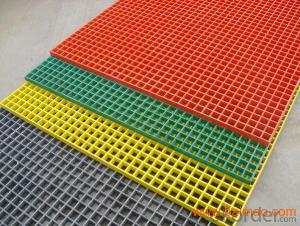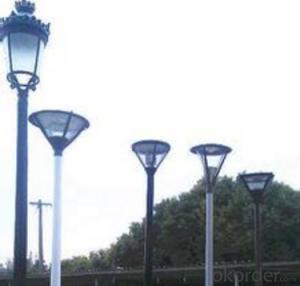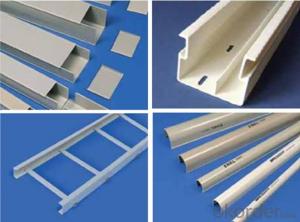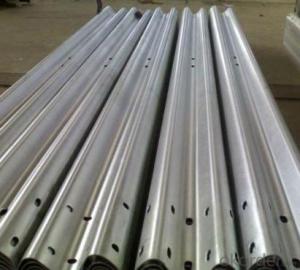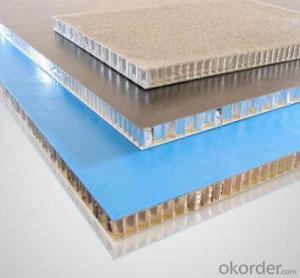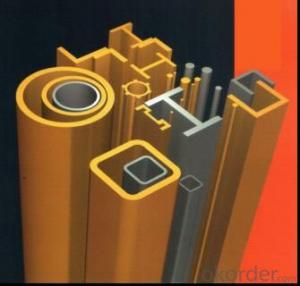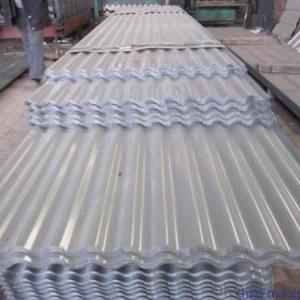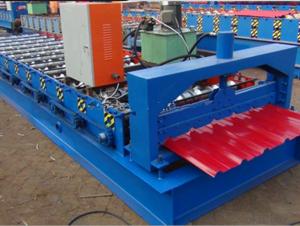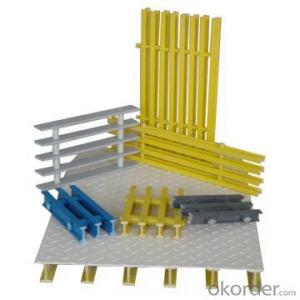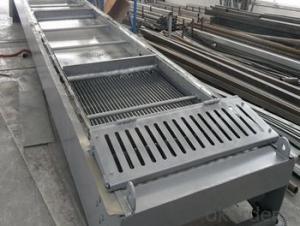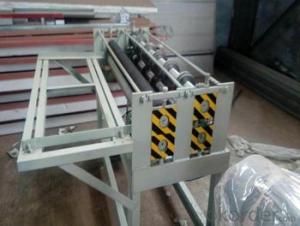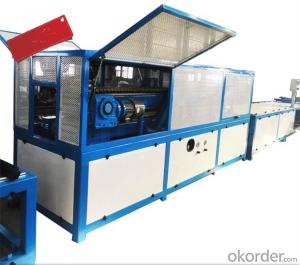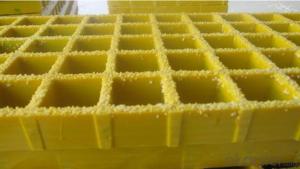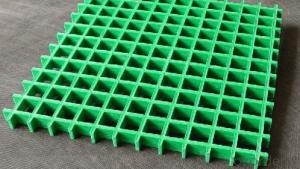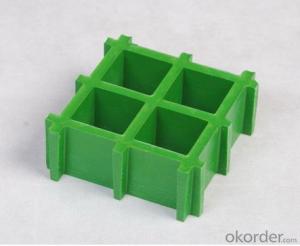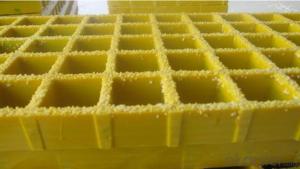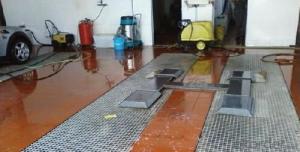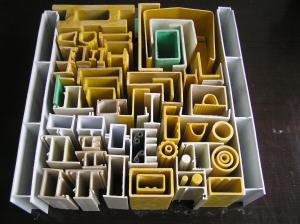FRP Pultrusion Profiles with Excellent Electromagnetism Property and Non-Toxic FRP Pultruded Grating
- Loading Port:
- Tianjin
- Payment Terms:
- TT OR LC
- Min Order Qty:
- 1 m.t.
- Supply Capability:
- 300000 m.t./month
OKorder Service Pledge
OKorder Financial Service
You Might Also Like
PRODUCT DESCRIPTION
Pultruded grating is made by a particular assembly process, which using “I” shape as its main load-bearing and special rod to go through the bearing bar. Pultruded grating include the standard grating and the custom grating, the custom grating can be designed to meet customer’s requirement or special using condition by changing the shape, size and space of the bearing bars, the surface can be covered with lozenge panel, grit panel, or added the anti-slippery sand directly.
FRP pultruded grating has the most characteristics of molded grating, but it has its distinct advantages, it has very high fiberglass content in the loading direction, so it has very high load capability, it has more superiority when used at wide span, so that the basic support will be decreased and the project cost will be reduced accordingly.
SPECIFICATION
Thickness (mm) | Bar width (mm) | Open space (mm) | Open rate (%) | Approx weight (kg/m |
25.4 | 15.2 | 22.8 | 60 | 13.2 |
25.4 | 15.2 | 15.2 | 50 | 15.9 |
25.4 | 15.2 | 10.1 | 40 | 18.5 |
25.4 | 40 | 10.8 | 21 | 14.5 |
38.1 | 15.2 | 22.8 | 60 | 15.8 |
38.1 | 15.2 | 15.2 | 50 | 19.1 |
38.1 | 15.2 | 10.1 | 40 | 22.4 |
50.8 | 25.4 | 25.4 | 50 | 16.6 |
50.8 | 25.4 | 12.7 | 33 | 21.1 |
CHOICE FOR PULTRUDED GRATING
Resin: GP resin, ISO resin, VE resin, Phenol resin
Color choice: Yellow, gray, green, custom color
Surface choice: Groove surface, grit surface, lozenge cover surface
FEATURES
a. Anti-corrosion and anti-rust
b. Light weight and high strength
c. Anti-flammable
d. Anti- fatigue
e. Safe and anti-slippery
f. Anti-ageing
g. Easy of maintenance
h. Excellent electromagnetism property
i. Good economic benefit
FIELDS SERVED
Sewage treatment,
water supply and drainage,
chemical industry,
oil industry,
power engineering,
pulp and paper,
construction engineering,
spinning, marine engineering.
APPLICATION
Operation terrace,
stair walkway,
ground floor,
trench cover,
sidewalk,
foot bridge,
equipment safety fence,
scaffold.
COMPANT DESCRIPTION
CNBM,China National Building Materials Group is a state-owned enterprise in charge of administrative affairs in china building materials industry. Established in 1984, CNBM is a large group corporation of building materials with total assets of 25 billion RMB and a total staff of 30,000.CNBM now owns 200 subordinating firms of solely owned and joint-venture companies.
CNBM International Corporation is one subsidiary of CNBM, we focus on offering good-quality products,professional service and complete solution to our customers. Strong delivery capacity, advanced technology& management, strong financing capability and excellent after-sale service are our advantages in sharing international market.
FAQ
1.Q:Are you factory or trading company ?
A:We are Factory produce FRP machines and FRP products.
2.Q:If can customized by customers requirements?
A:yes,we can produce the machine with customized size.
3.Q:How about the payment?
A:We accept any kind of payment.
4.Q:What is the guarantee?
A:Gurantee is one year.
5.Q:If you can training?
A:yes ,we can training in our factory also can send engineers to your factory training.
PICTURES
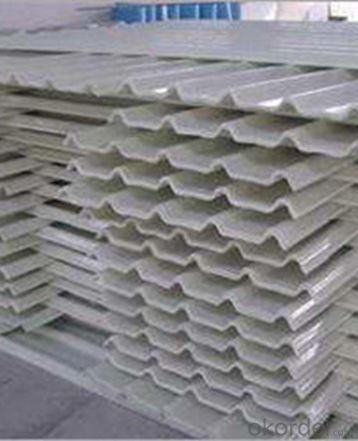
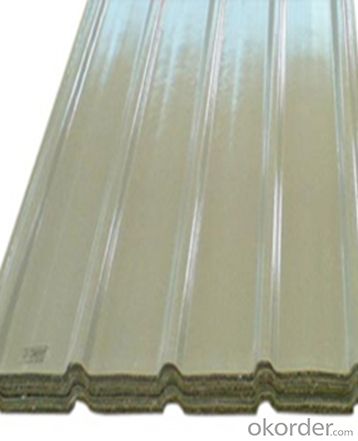
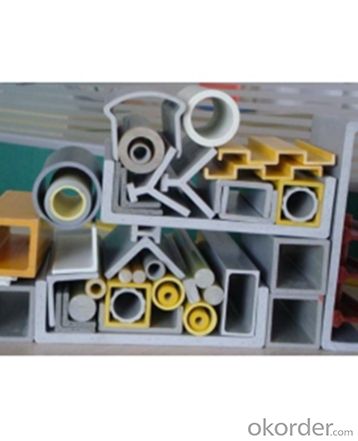
- Q: Are FRP pultrusion profiles resistant to alkaline substances?
- FRP pultrusion profiles are known for their general resistance to alkaline substances. By using fiberglass reinforced polymer (FRP) in pultruded profiles, they acquire excellent resistance against a wide range of chemicals, including alkaline substances. The manufacturing process typically involves using a thermosetting polymer, such as polyester or vinyl ester, as the resin. This choice of resin ensures high resistance to alkaline solutions. Additionally, the fiberglass reinforcement adds strength and durability to the profiles, making them highly resistant to corrosion and degradation caused by alkaline substances. However, it is important to note that the specific resistance of FRP pultrusion profiles to alkaline substances may vary depending on the resin formulation and manufacturing process used. Therefore, it is advisable to consult the manufacturer or supplier to confirm that the profiles meet the specific resistance requirements for alkaline environments.
- Q: Can FRP pultrusion profiles be used in telecommunications applications?
- Telecommunications applications can utilize FRP pultrusion profiles, which offer a range of advantages that render them suitable for such infrastructure. To begin with, these profiles possess the desirable combination of being lightweight and strong, making them an excellent choice for supporting antennas, cable trays, and equipment racks. Their high strength-to-weight ratio enables easier installation and transportation while providing the necessary structural support. Moreover, FRP pultrusion profiles display corrosion resistance, a crucial characteristic for telecommunications applications. Given the exposure of telecommunications infrastructure to harsh environments like moisture, chemicals, and extreme temperatures, FRP's non-corrosive properties guarantee long-term durability and reliability, distinguishing it from traditional materials such as steel or wood. Additionally, FRP pultrusion profiles offer electrical insulation properties, which are vital in telecommunications applications. By not conducting electricity, they ensure safety in areas where electrical equipment is present. This feature prevents electrical interference and preserves the integrity of the telecommunications system. Furthermore, FRP pultrusion profiles can be customized to meet specific design requirements, as they can be manufactured in various shapes and sizes. This flexibility allows for the efficient design of telecommunications infrastructure, making FRP pultrusion profiles suitable for a wide range of applications within the industry. In conclusion, FRP pultrusion profiles prove to be well-suited for telecommunications applications due to their lightweight yet strong nature, corrosion resistance, electrical insulation properties, and customization possibilities. These attributes guarantee their reliability in supporting and protecting telecommunications infrastructure.
- Q: Are FRP pultrusion profiles resistant to electrical arcing?
- Generally, FRP pultrusion profiles exhibit resistance to electrical arcing due to their composition of non-conductive materials such as fiberglass reinforced plastic. By not conducting electricity, these profiles prove to be an optimal choice when concerns arise regarding electrical arcing and conductivity. Nevertheless, it is crucial to acknowledge that the extent of their resistance to electrical arcing may differ based on the unique composition and design of the FRP pultrusion profiles. Therefore, it is advisable to consult the manufacturer or supplier of the profiles to ensure they meet the specific electrical resistance standards required for a given application.
- Q: Are FRP pultrusion profiles resistant to saltwater corrosion?
- Yes, FRP pultrusion profiles are highly resistant to saltwater corrosion. The combination of their fiberglass reinforcement and the corrosion-resistant resin matrix used in their manufacturing make them ideal for applications in marine environments. They are capable of withstanding prolonged exposure to saltwater without degradation or loss of structural integrity.
- Q: Are FRP pultrusion profiles impact resistant?
- Yes, FRP (Fiber Reinforced Polymer) pultrusion profiles are generally known for their high impact resistance. The combination of reinforcing fibers, such as glass or carbon, with a polymer matrix results in a material that is inherently strong and durable. The pultrusion process further enhances the impact resistance of these profiles by aligning the fibers in the direction of the load, providing optimal strength against impacts. FRP pultrusion profiles also have a high strength-to-weight ratio, which allows them to withstand heavy impacts without significant damage or deformation. This makes them suitable for applications where impact resistance is crucial, such as in construction, transportation, and infrastructure projects. Moreover, FRP pultrusion profiles offer excellent resistance against corrosion, chemicals, and UV radiation, which further contribute to their durability and long-term performance. These profiles can maintain their impact resistance properties even in harsh environments, making them a preferred choice for various industries. However, it is important to note that the specific impact resistance of FRP pultrusion profiles may vary depending on the specific design, composition, and manufacturing process. Therefore, it is recommended to consult with the manufacturer or supplier to ensure the profiles meet the desired impact resistance requirements for a particular application.
- Q: Can FRP pultrusion profiles be used in the construction of swimming pool enclosures?
- Swimming pool enclosures can make use of FRP pultrusion profiles, which are known for their excellent strength-to-weight ratio, corrosion resistance, and durability. This makes them an ideal choice for outdoor applications like swimming pool enclosures. To manufacture FRP pultrusion profiles, fiberglass rovings are pulled through a resin bath and then through a heated die. This results in a continuous profile of uniform shape and strength. This manufacturing process ensures that the profiles are strong, stiff, and lightweight, making them easy to handle and install. In the construction of swimming pool enclosures, FRP pultrusion profiles can be utilized for various structural elements such as beams, columns, trusses, and panels. These profiles provide the necessary strength and support, while also offering resistance to corrosion, moisture, and UV radiation, which are common challenges in a swimming pool environment. Furthermore, FRP pultrusion profiles can be customized to meet specific design requirements, allowing for flexibility in creating unique and aesthetically pleasing swimming pool enclosures. They can be fabricated in different shapes, sizes, and colors, enabling the desired architectural look and feel. Overall, FRP pultrusion profiles offer a reliable and long-lasting solution for constructing swimming pool enclosures. They provide the necessary strength, durability, and resistance to environmental factors. Additionally, their lightweight nature simplifies handling and installation, ultimately reducing construction time and costs.
- Q: Can FRP pultrusion profiles be used in the agricultural and farming industry?
- Yes, FRP pultrusion profiles can be used in the agricultural and farming industry. These profiles are lightweight, durable, and resistant to corrosion, making them suitable for various applications such as structural supports, fencing, gates, and equipment enclosures. They offer high strength-to-weight ratio, excellent weather resistance, and can withstand harsh environmental conditions commonly found in agricultural settings. Additionally, FRP profiles are non-conductive and have low thermal conductivity, which makes them ideal for electrical insulation and thermal management in farm equipment.
- Q: Are FRP pultrusion profiles resistant to hydrochloric acid?
- Yes, FRP pultrusion profiles are generally resistant to hydrochloric acid due to the corrosion-resistant properties of the fiberglass reinforcement and the resin matrix used in their construction. However, the specific resistance may vary depending on the composition and concentration of the acid, and it is recommended to consult the manufacturer's specifications for detailed information regarding chemical resistance.
- Q: Can FRP pultrusion profiles be used in the construction of modular buildings?
- Yes, FRP pultrusion profiles can be used in the construction of modular buildings. FRP (Fiber Reinforced Plastic) pultrusion profiles offer several advantages such as high strength-to-weight ratio, corrosion resistance, and design flexibility. These profiles can be easily fabricated into various shapes and sizes, making them suitable for modular building applications. Additionally, FRP pultrusion profiles are durable, low-maintenance, and exhibit excellent thermal insulation properties, making them a reliable choice for constructing modular buildings.
- Q: Can FRP pultrusion profiles be used in modular construction?
- Yes, FRP pultrusion profiles can be used in modular construction. FRP (Fiber Reinforced Polymer) pultrusion profiles offer several advantages such as high strength-to-weight ratio, corrosion resistance, and design flexibility. These properties make them suitable for various applications in modular construction, including structural elements, cladding, and panel systems. Additionally, FRP pultrusion profiles can be easily molded into different shapes and sizes, making them compatible with the modular construction approach, where standardized components are assembled to create a larger structure.
Send your message to us
FRP Pultrusion Profiles with Excellent Electromagnetism Property and Non-Toxic FRP Pultruded Grating
- Loading Port:
- Tianjin
- Payment Terms:
- TT OR LC
- Min Order Qty:
- 1 m.t.
- Supply Capability:
- 300000 m.t./month
OKorder Service Pledge
OKorder Financial Service
Similar products
Hot products
Hot Searches
Related keywords
